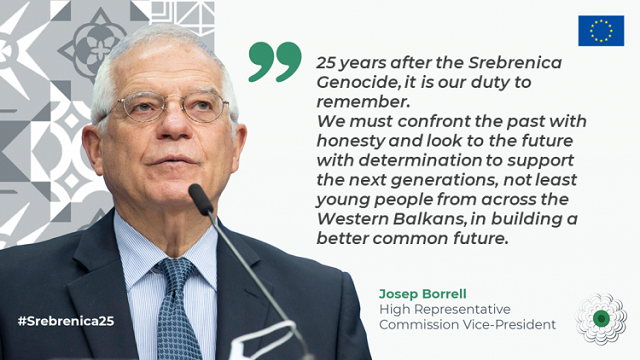The EU takes part in commemorating the Srebrenica genocide, one of the darkest chapters of modern European history. Our duty is to remember and learn from Srebrenica, and to honour the memory of those laid to rest and all those still missing. This is a necessary step to work for a better common future for all Europeans.
On the 11 July and during the week preceding it, the European Union arranged and took part in different activities to help commemorate the Srebrenica Genocide, and share its learnings across the continent. It was also announced that the EU will support the Srebrenica Memorial Centre(link is external) with €340,000 to help restore it and support its function as a knowledge centre.
The coronavirus pandemic imposed a limited participation at the 11 July ceremony at the Srebrenica-Potočari Genocide Memorial. However, authorities and representatives of civil society organisations in Bosnia and Herzegovina, the European Union, and partners worldwide marked and commemorated the 25th anniversary of the Srebrenica Genocide in other ways.
A video message from President Ursula von der Leyen was aired during the live TV broadcast of the Commemoration on the Bosnia and Herzegovina Radio Television (BHRT).
Read also
In a joint statement, President Michel, President von der Leyen, and High Representative/Vice-President Borrell expressed: “25 years ago Europe failed to live up to the promise that never again would there be such tragedy on our continent. It is also a powerful signal of the need to stand up firmly and without exceptions for the universal values – human dignity, in particular – which underpin our Union.”
They also stressed: “for peace and reconciliation to continue, the way forward must include the recognition of suffering, mutual respect and dignity. Day-to-day reconciliation has to become reality in politics, in schools, in town halls, in everyday life. “
Reconciliation goes hand in hand with the respect of historical truth, established facts and justice. Srebrenica is also part of our shared European history, of relevance to all of us, which we all can and need to learn from. On 7 July, the EU institutions organised the digital conference “Remembering Srebrenica: Europe’s shared history” where voices from civil society and youth reflected with witnesses and survivors upon the Srebrenica Genocide and discussed ways to build a future of truth and justice for the current and coming generations.
The European Union supports the citizens of Bosnia and Herzegovina and of the Western Balkans on overcoming the legacy of the past and moving forward toward the EU.
As High Representative/Vice-President Josep Borrell wrote in his OpEd: “While remembering Srebrenica, the European Union stands by the people of Bosnia and Herzegovina and the Western Balkans. We are committed to doing our part, to build a future together in which conflicts and atrocities are no longer conceivable. I count on the same level of commitment and dedication from Western Balkans leaders to work actively with us towards building a peaceful and prosperous future together.“
Johann Sattler, Head of Delegation and European Union Special Representative in Bosnia and Herzegovina represented the EU at the 11 July Commemoration at the Memorial Centre in Potočari, Srebrenica. He also published the blog post “Peace is built upon justice(link is external)” and participated in the nomadic artwork Sto te nema(link is external), which this year came to the Memorial Centre(link is external).
Background
In July 1995, over 8,372 boys and men were systematically and deliberately killed in and around the city of Srebrenica. The people of Srebrenica counted on the UN and the city’s status as a safe haven but instead became victims of a genocide. International courts have established these atrocities as genocide. The tragedy of Srebrenica took place at the depth of the war that swept across Bosnia and Herzegovina from 1992 to 1995 that claimed around 100,000 victims, half of them civilians.
The European Union supports Bosnia and Herzegovina to advance on its European path, establishing a society where pluralism, justice and human dignity prevail. Via its engagement with Bosnia and Herzegovina and the Western Balkan partners the EU supports reconciliation and regional cooperation, to build a peaceful and prosperous future for the people of the region.
The European Union has supported Srebrenica and the surrounding municipalities including mobilising €10 million with particular focus on reintegration of life into the community and building the potential for economic growth and development. Recently, the EU has announced new financial assistance for the rehabilitation of parts of the building located in the former Battery Factory(link is external), in the Srebrenica-Potočari Genocide Memorial Centre. Since 2004, EU funds have also supported the crucial work of the International Commission for Missing Persons (ICMP) in collecting and processing DNA samples to identify missing persons, and documenting facts about the genocide.
European Union






















































